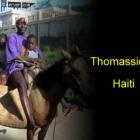ADVERTISEMENT
Panic Disorder - Haiti Observer Blog
Panic Disorder, Haiti Observer Blog. Read the following articles about Panic Disorder
Medication and Therapy Best Practices for Panic Attacks and Panic Disorder
Panic attacks and their off-spring, panic disorder, can be both managed and treated.
Treatment for panic attacks or panic disorder falls under three categories: medication, therapy, and health regimen.
Medication options that prescribing physicians use to treat panic attacks or panic disorder include a variety of antidepressants, anti-seizure, anti-anxiety, and heart medications.
The therapy treatment plan most effective uses both cognitive and behavioral approaches. During the first phase of therapy, information about panic attacks and panic disorder and its commonplace occurrence in many people's lives offers reassurance the sufferer is not losing their mind, or is at risk of suffering a heart attack. The second phase introduces behavior modification techniques to overcome negative perceptions about panic attacks and panic disorder.
Managing Panic Attacks
Learning to manage a panic attack is the difference between living a full life or a severely constricted one.
One of the primary ways to manage a panick attack is to understand what you are experiencing is a panic attack, not a heart attack, as is so often the perception.
When you feel a panic attack coming on, calm down. This is an effective and powerful response to feeling out of control that so often accompanies an attack.
Repeat a mantra, something as simple as 'I'm going to be okay'.
Panic Disorder Phobias Limit Daily Activities
Panic disorder is the label used to describe someone, who has suffered repeated panic attacks.
Panic attacks, occurring at regular intervals without knowledge of the trigger mechanism, can debilitate a person in their everyday lives.
Panic attacks appear without warning and can last from several minutes to several hours. The sufferer is subjected to paralyzing pain, thoughts of imminent death, depersonalization (withdrawal from reality), rapid heart beats, and other alarming symptoms. Oftentimes, a first-time sufferer will end up in the emergency room, believing they have suffered a heart attack.
Understanding all this, it's not surprising that sufferers often develop a phobia. They believe that the panic attack is associated with the place at which it occurred. They begin to experience a side effect known as situational avoidance, restricting their ability to lead a normal life. In extreme cases, the sufferer develops agoraphobia, a fear of going outside. They become recluses, afraid of venturing outside their homes, for fear of an attack.
Our objective is to share with you news and information about Haiti and the people of Haiti. Traditions, habits and the way we were or grew are alive in this site. We highly recommend that you Subscribe to our Newsletter and also share with us some of the things that are memorable and made us unique people.

 Haiti tech Summit
Haiti tech Summit  Newsletter
Newsletter  Haitians are a Proud People
Haitians are a Proud People  Battle of Vertieres
Battle of Vertieres  Thomassique, Haiti
Thomassique, Haiti